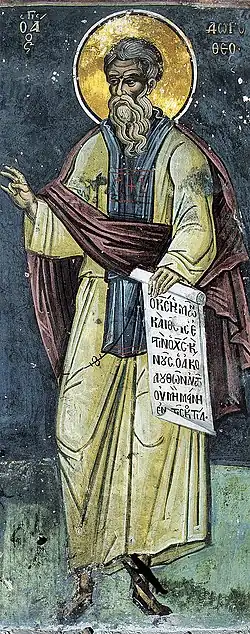Dorotheus of Gaza

Dorotheus of Gaza (died c. 560/80) was a Christian monk and writer. He entered the famous monastery of Seridus where he became a disciple of the hermits Barsanuphius and John the Prophet. Later, he became a spiritual director himself and wrote various discourses on monastic life. His writings were widely disseminated across the Orthodox and later also the Catholic world.
Quotes
On Conscience
- 'When God created man, he breathed into him something divine, as it were a hot and bright spark added to reason, which lit up the mind and showed him the difference between right and wrong. This is called the conscience, which is the law of his nature. This is compared to the well which Jacob dug, as the Fathers say, and which the Philistines filled up. That is, to this law of conscience adhered the patriarchs and all the holy men of old before the written law, and they were pleasing to God. But when this law was buried and trodden underfoot by men through the onset of sin, we needed a written law, we needed the holy prophets, we needed the instruction of our Master, Jesus Christ, to reveal it and raise it up and bring to life through the observance of the Commandments that buried spark. '
- Cited in Dorotheos of Gaza - Discourses and Sayings, p. 105
On Refusal to Judge our Neighbor

- 'Suppose we were to take a compass and insert the point and draw the outline of a circle. The centre point is the same distance from any point. on the circumference. Now concentrate your minds on what is to be said! Let us suppose that this circle is the world and that God himself is the centre; the straight lines drawn from the circumference to the centre are the lives of men. To the degree that the saints enter into the things of the spirit, they desire to come near to God; and in proportion to their progress in the things of the spirit, they do in fact come close to God and to their neighbor. The closer they are to God, the closer they become to one another; and the closer they are to one another, the closer they become to God. Now consider in the same context the question of separation; for when they stand away from God and turn to external things, it is clear that the more they recede and become distant from God, the more they become distant from one another. See! This is the very nature of love. The more we are turned away from and do not love God, the greater the distance that separates us from our neighbor.'
- Cited in Dorotheos of Gaza - Discourses and Sayings, p. 139
On Self-Accusation
- 'Let us examine brothers, how it is that at one time a man hears disparaging remark and passes it by without being disturbed, as if he had hardly heard it, and at another time he hears it and is immediately disturbed. What is the reason for such a difference? Is there only one reason for this difference or are there many? I see many proximate causes for this state of affairs, but there is one thing, one might say, which is the basic generating cause of them all. First, it happens when a man is at prayer or spiritually at rest and being, as one might say, in a good disposition he bears with his brother and is not disturbed. Again it may happen that he has a special affection for the someone who attacks him and for this he will suffer without difficulty anything that person does to him. Then there is the person who disdains the one who wants to cause him pain and despises what he does, and does not treat him as a man or attribute any meaning to what. is said or done by him.
- Cited in Dorotheos of Gaza - Discourses and Sayings, p. 140
On Travelling the Way of God with Vigilance and Sobriety
- 'A man who gives way to his passions and suffers for it is like a man who is shot at by an enemy, catches the arrow in his hands, and then plunges it into his own heart. A man who is resisting his passions is like a man who is shot at by an enemy, and although the arrow hits him, it does not seriously wound him because he is wearing a breastplate. But the man who is uprooting his passions is like a man who is shot at by an enemy, but who strikes the arrow and shatters it or turns it back into his enemy’s heart. As the psalmist says, ‘Their own sword shall enter their own heart and their bow shall be broken to pieces.’'
- Cited in Dorotheos of Gaza - Discourses and Sayings, p. 171
On Fear of Punishment
- 'Therefore, everyone who wants to be saved must not only stop doing evil, also work at what is good, as it says in the psalm, ‘Turn away from evil and do good.’ Mark what is says. Not only ‘turn from evil’, but also ‘do good’! For example: If a man was used to being unjust, he wants not only to stop being unjust but to act with justice continually. If a man was used to always to be angry, he wants not only to stop being angry but to cultivate mildness. If he was bold and insolent, he must not only give it up, but he must act with humility. This is to turn away from evil and to do good. Each of the vices has its contrary virtue. Pride has humility, avarice has almsgiving; licentiousness, self-discipline; neglect, perseverance; anger has meekness; hatred, love. In short, I repeat, every vice has its contrary virtue.'
- Cited in Dorotheos of Gaza - Discourses and Sayings, p. 188
On Enduring Temptation Calmly and Thankfully
- 'If a man has a friend and he is absolutely certain that his friend loves him, and if that friend does something to cause him suffering and be troublesome to him, he will be convinced that his friend acts out of love and he will never believe that his friend does it to harm him. How much more ought we to be convinced about God who created us, who created us out of nothingness to existence and life, and who became a man for our sakes and died for us, and who does everything out of love for us?'
- Cited in Dorotheos of Gaza - Discourses and Sayings, pp. 192-193
Of the Relations between the Abbot and his Disciples in Monasteries
- 'Hold fast to indifference in knowledge and believe that everything that concerns us, even the most trivial thing, happens through God’s providence, and you will bear anything that comes upon you without being troubled. '
- Cited in Dorotheos of Gaza - Discourses and Sayings, p. 239
- 'Do not desire to know the evils of your neighbor and do not entertain suspicions about him, but if suspicious thoughts burst out of your own wickedness, take care to mould them into noble thoughts, and in all things give thanks in accord with God’s goodness and holy love.'
- Cited in Dorotheos of Gaza - Discourses and Sayings, p. 240
Reply to certain hermits who asked him about holding meetings

- 'As was said about Abbot Anthony, brethren, namely, that when he was visiting the whatever good he saw in each he set about to acquire for himself. From one he picked up self-control, from another humility,from another hard work, from another serenity. And so he was found to have in himself the good found in each of the others. This then is what we ought to do and why we ought to come together, and when we return to our cell let us examine ourselves and learn where we have been helped and: what good we have received. '
- Cited in Dorotheos of Gaza - Discourses and Sayings, p. 246
- 'I heard about a certain brother who, if he saw that his [brethren's] cell was uncared for and disorderly when he went to consult any of the brethren, used to say to himself, ‘Happy indeed is this brother! How free from care about many things, or rather, about all earthly things, and he so fixes his whole mind on high so that he has no leisure to put his cell in order.’ And again, if he came on another and saw his cell in good order, clean, beautiful, he used to say to himself, ‘The soul of this brother must be as clean and well-kept as his cell, for the good state of his soul must be represented by the good state of his cell.” He never said about anyone, ‘This man is uncouth or that one is vainglorious’, but on account of his own habitual good disposition he took edification from each of them.'
- Cited in Dorotheos of Gaza - Discourses and Sayings, p. 248
Maxims of the Spiritual Life
Abbot Dorotheus used to say:
- 'In all things that come upon me I never desire to run around in quest of human wisdom, but I always act with the small power I have on whatever it is, and at the same time leave the whole thing to God.'
- Cited in Dorotheos of Gaza - Discourses and Sayings, p. 252
- 'He who does not hold to his own will always has what he will; for externally he does not get his own way but whatever happens, no matter what it is, gives him quiet satisfaction and he discovers for himself that he has what as they he will. For he does not want things to happen as he wishes; he wants things to have happened as they happened.'
- Cited in Dorotheos of Gaza - Discourses and Sayings, p. 252